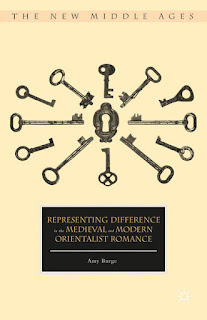Amy Burge's Representing Difference in the Medieval and Modern Orientalist Romance is due for publication in March 2016 by Palgrave Macmillan. It
proffers innovative case studies on representations of cross-religious and cross-cultural romantic relationships in a selection of late medieval and twenty-first century Orientalist popular romances. Comparing the tropes, characterization and settings of these literary phenomena, and focusing on gender, religion, and ethnicity, the study exposes the historical roots of current romance representations of the east, advancing research in Orientalism, (neo)medievalism and medieval cultural studies. Fundamentally, Representing Difference invites a closer look at medieval and modern popular attitudes towards the east, as represented in romance, and the kinds of solutions proposed for its apparent problems.Women & Erotic Fiction: Critical Essays on Genres, Markets & Readers was published earlier this year for Kindle but isn't due for publication as a paperback until November. Unfortunately I haven't seen a copy and the snippets of information available online aren't helping me identify which of the essays deal with romance fiction. Even the titles aren't necessarily that helpful because some people use "romance" in a broader sense than the RWA or Pamela Regis do (and those are the definitions guiding me in my selection of items for the bibliography). I've added the following to the Romance Wiki bibliography:
- Morrissey, Katherine, 2015.
- “Steamy, Spicy, Sensual: Tracing the Cycles of Erotic Romance.” Women & Erotic Fiction: Critical Essays on Genres, Markets & Readers. Ed. Kristen Phillips. Jefferson: McFarland, 2015. 42-58.
- Veldman-Genz, Carole, 2015.
- "Selling Gay Sex to Women: The Romance of M/M and M/M/F Romantica." Women & Erotic Fiction: Critical Essays on Genres, Markets & Readers. Ed. Kristen Phillips. Jefferson: McFarland, 2015. 133-149.
I'd be grateful if anyone could let me know which of the other essays in the volume should also be included:
- Introduction: Shattering Releases (Kristen Phillips)
- From Black Lace to Shades of Grey: The Interpellation of the "Female Subject" into Erotic Discourse (Simon Hardy)
- Refiguring Penetration in Women’s Erotic Fiction (Amalia Ziv)
- Erotic Pleasure and Postsocialist Female Sexuality: Contemporary Female "Body Writing" in China (Eva Chen)
- Good Vibrations: Shaken Subjects and the Disintegrative Romance Heroine (Naomi Booth)
- On Not Reading Fifty Shades: Feminism and the Fantasy of Romantic Immunity (Tanya Serisier)
- Permissible Transgressions: Feminized Same-Sex Practice as Middle-Class Fantasy (Jude Elund)
- The Politics of Slash on the High Seas: Colonial Romance and Revolutionary Solidarity in Pirates Fan Fiction (Anne Kustritz)
- Male Homoerotic Fiction and Women’s Sexual Subjectivities: Yaoi and BL Fans in Indonesia and the Philippines (Tricia Abigail Santos Fermin)
- Selling Authentic Sex: Working Through Identity in Belle de Jour’s The Intimate Adventures of a London Call Girl (Victoria Ong)
- Sexing Education: Erotica in the Urban Classroom (Alyssa D. Niccolini)

